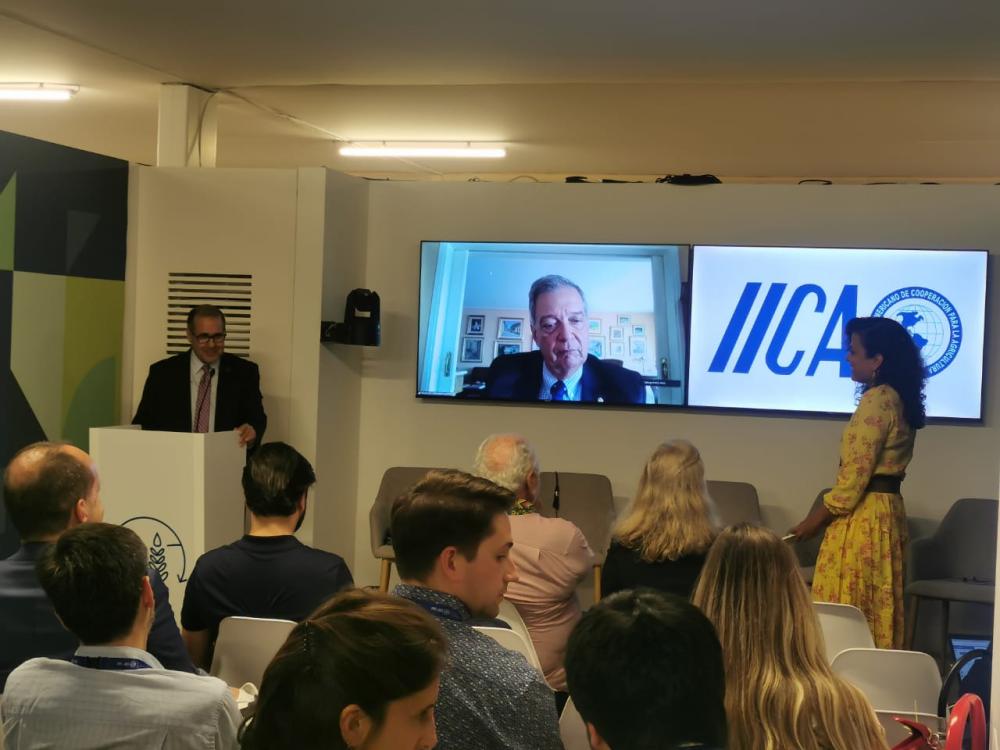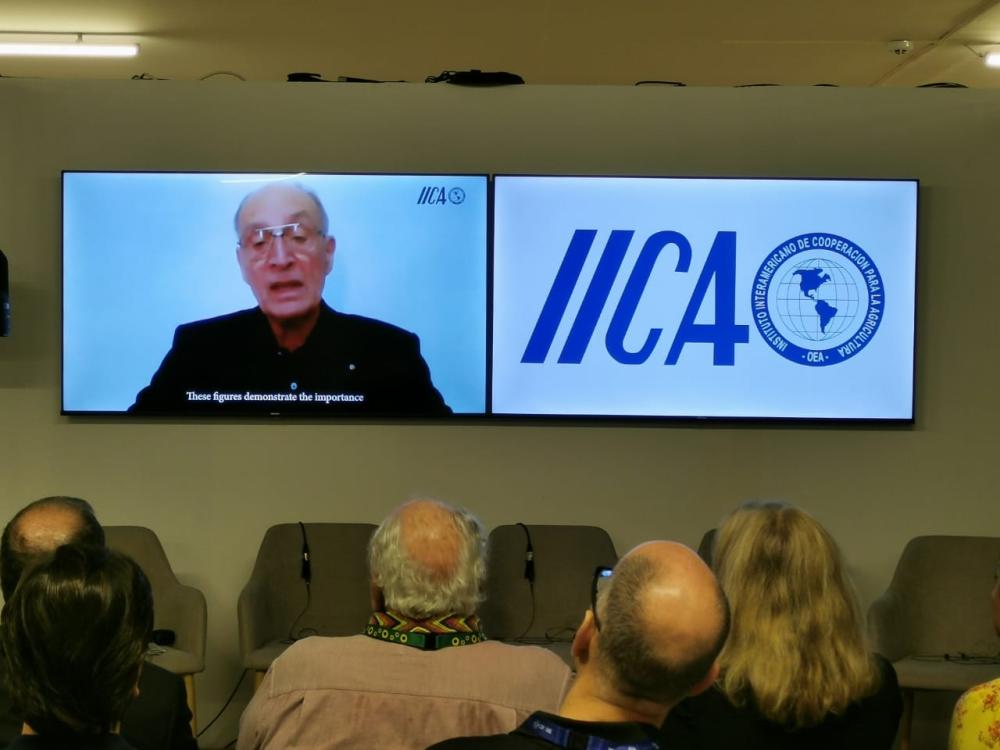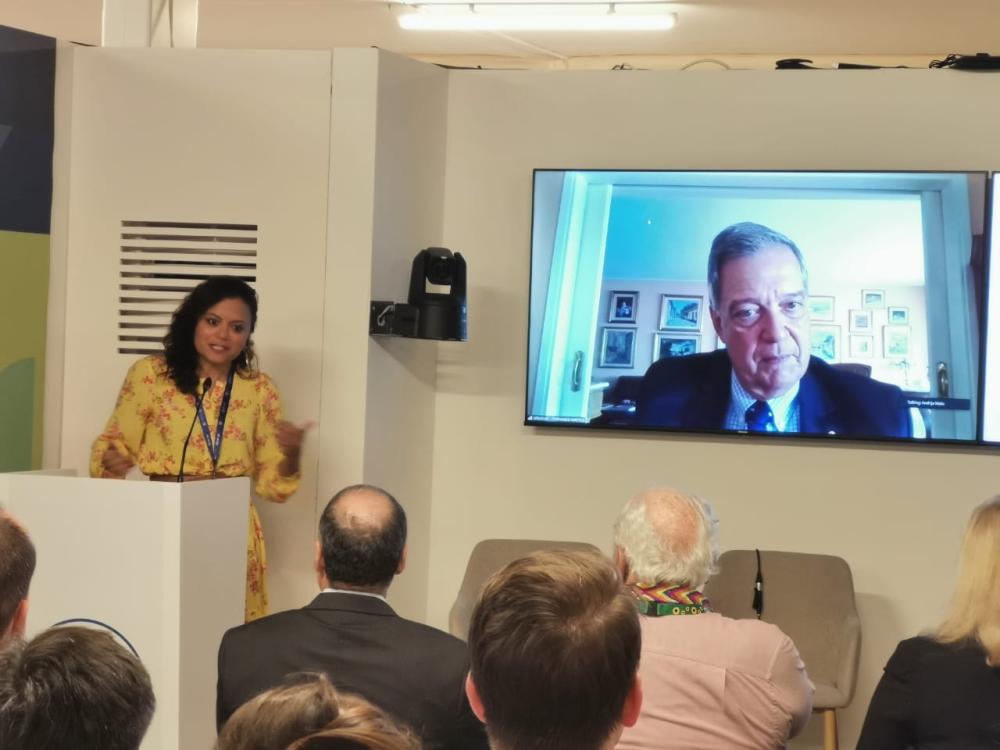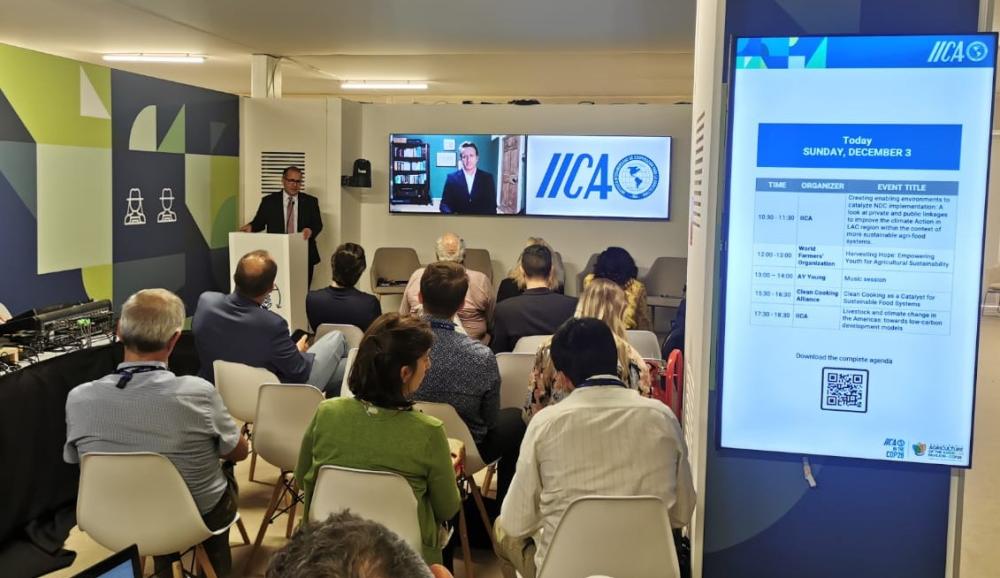Document presented at the IICA pavilion of COP28 shows that GHG emissions attributed to cattle farming are not properly accounted for and are lower than those alleged

DUBAI, United Arab Emirates, 5 December 2023 (IICA) – Cattle farming has a much smaller impact on global warming than is alleged, if the measurements adequately consider the greenhouse gas emissions that correspond to this activity -during the animal husbandry period- and when excluding those that come from other sectors of the economy and are incorrectly attributed to cattle farming. This was revealed by a study presented at the pavilion of the Inter-American Institute for Cooperation on Agriculture (IICA) at COP28.
The study, reflected in the document “Cattle farming and climate change in the Americas: in search of net zero emissions”, written by Argentine scientist Ernesto Viglizzo, warns that publications that hold cattle farming accountable for a significant part of climate change are wrong, as they incorrectly attribute emissions that come from other sectors of the economy, such as industrial, transportation, residential, distribution or domestic consumption, to this activity.
In this document, the researcher points out that only the emissions from livestock should be attributed to beef chains. “A livestock producer – he explains – cannot be held accountable for emissions that do not strictly depend on his activities but on other sectors.”
Some food importing countries use a system called Carbon Footprint, through which they estimate the emissions of a product, often lifting trade barriers for products entering from third countries, which in the case of beef include not only the emissions generated by livestock production but also those that occur in other sectors, such as meat processing plants, transportation and wholesale or retail distribution.
This methodology, which produces a very high result, differs from the one recommended by the Intergovernmental Panel of Experts on Climate Change (IPCC), the world's highest scientific authority on the subject, which attributes emissions to the sectors that generate it.
Sectors such as meat processing, transportation and distribution, which occur after the animal husbandry period, generate a large amount of emissions, since they consume fossil fuels, which are mainly responsible for climate change.

Viglizzo is a recognized international expert on issues of livestock, soils and climate change and Principal Investigator of the National Institute of Agricultural Technology (INTA) of Argentina and of the main state scientific organization of his country, CONICET. He is an agricultural engineer, and holds a PhD from the Catholic University of Leuven (Belgium). He is also a member of the National Academy of Agronomy and Veterinary Medicine of Argentina.
He was responsible for the coordination of the National Environmental Management Program of INTA and IICA-PROCISUR, among other services. In addition, he joined scientific teams from international organizations that study climate change and the global environment, such as the IPCC, GEO 5, Millennium Ecosystem Assessment and Subglobal Assessment.
For his scientific contribution to the IPCC, he was awarded a replica of the 2007 Nobel Peace Prize, which the IPCC shared with Al Gore, Vice President of the United States.
He has been a guest lecturer on climate and environmental problems in the Americas at Harvard and Oxford Universities, and at events held in Paris, Berlin, Geneva, Leuven, Stellenbosch (South Africa) and universities in Latin America. He has also been invited as editor and co-editor of special issues of prestigious international scientific journals such as Springer-Nature and Elsevier.
The presentation of the document at the IICA pavilion featured the participation of the Minister of Livestock, Agriculture and Fisheries of Uruguay, Fernando Mattos; the Secretary of Innovation, Sustainable Development, Irrigation and Cooperatives of the Ministry of Agriculture and Livestock of Brazil, Renata Miranda; the Director General of IICA, Manuel Otero; the Deputy Director General of the Institute, Lloyd Day – who acted as moderator – and Ruaraidh Petre, Executive Director of the Global Roundtable for Sustainable Beef (GRSB).
Mattos praised the document prepared by Viglizzo and assured that “in recent decades we have been victims of very damaging attacks on the image of the agricultural and livestock sector, trying to hold us responsible as one of the main causes of greenhouse gas (GHG) emissions. But this is the only productive sector of the economy that is essential for food security and must be interpreted for what it is: a sector that captures carbon.”
The Uruguayan Minister added that “we are essential for the world's food security and we must continue to insist that funds be made available to help with the adaptation of the countries suffering from the worst effects of climate variability.”

For her part, the Secretary (Vice Minister) of the Ministry of Agriculture and Livestock of Brazil indicated that “when we talk about livestock and climate change we must talk about emissions reduction and adaptation, because if we do not adapt, we will not be able to produce food in the future.”
The Brazilian official, who expressed her satisfaction with the content of the study and congratulated IICA for promoting this type of publications, also assured that "we need to remember who the largest emitters (of GHGs) are and the sector where these emissions originate."
Ruaraidh Petre, on the other hand, thanked IICA for the document, defended an “industry that feeds the people” and recalled that “without food we could not have this discussion, because we would be hungry.”
He asked, in this sense, “not to play with a sector that saves and feeds lives,” and highlighted the sector’s ability to sequester carbon. “We can feed 9 billion people without adding greenhouse gas emissions. We are the sector that can sequester carbon and feed the world,” he said.
Otero, for his part, explained that livestock farming accounts for half of the agricultural GDP of Latin America and the Caribbean, and that beef generates 23 billion USD in foreign currency, in addition to the 3 billion USD generated by dairy products.
“Livestock farming in the region has made important progress towards the transformation of sustainable livestock systems, with strategies to reduce impacts on water, soil and emissions, including technological development and adoption of good practices. We must continue to show this at the different international forums” he said.
Impact that does not exceed 5%
The document written by Viglizzo states that “if only the biogenic emissions (those produced by cows) were attributed to cattle farming, it would become very clear that the impact of this activity on the global climate is much lower than estimated. Currently, this value does not exceed 5% of global emissions and this percentage tends to decrease when compared with the global carbon emissions of all sectors of the economy and society”.
The document also explains that the global impact is lower when estimating emissions from livestock in the Americas, because pastoral systems predominate, which have the potential of fully or partially offsetting carbon emissions from livestock through photosynthesis.
The results of field studies reflected in the document show that it is possible to differentiate, through relatively simple methods, producers who generate carbon credits from those who do not. This is the first step towards recognizing those that do generate these credits, who are undoubtedly part of the solution to climate change.
Viglizzo suggests that the Americas have begun a transition process towards low-carbon livestock development models. In this context, the captured carbon should be credited as a tradable commodity such as meat, milk or grains. As for the reduction of emissions, the region should be included in projects that certify credits for these results.
Another aspect that must be considered is that methane emissions, the predominant greenhouse gas in cattle farming, has an average residence time in the atmosphere of about 11.8 years, much less than the residence time of carbon dioxide, which is estimated at about a thousand years.
The document goes on to argue that “another important aspect, generally ignored in the predominant arguments, is that the incidence of beef cattle in global carbon emissions has shown a persistent decrease over the last 60 years. Simply put, this means that emissions from burning fossil fuels have grown at a rate significantly greater than the rate of increase in biogenic emissions from cattle.”
The study also analyzes the climate-smart technology packages that are already being applied in livestock farming and with which it is possible to capture tens of billions of carbon annually and generate positive balances that would benefit all agri-food chains.
Some of these practices are: design of different silvopastoral configurations, use of organic amendments, rock weathering through the crushing of silicates that produce inorganic capture of atmospheric carbon, preparation of fertilizers through renewable energies, use of methane-reducing additives in ruminants, reduction of food losses and waste, application of plant carbon by combustion of biomass (biochar), and production of bio-fertilizers and biogas from feces and urine.

Distorted visions
The document warns that during the last 20 years numerous global academic and scientific media have focused on the alleged negative impact of cattle farming on the environment, climate and human health.
The work presented at the IICA pavilion argues that this vision fails to consider the essential roles and functions that cattle production systems play in environments and ecosystems.
According to the paper, this point of view ignores the essential role that cattle farming plays for food security and in the social reality and the economies of developing countries.
The meat and dairy industries are also key in improving the income of livestock farmers in developing regions, and they are a source of foreign currency that stabilizes the economies of producing and exporting countries.
“These are highly relevant social aspects that are often selectively neglected by academic and scientific centers in industrialized countries,” the study concludes.
The Home of Sustainable Agriculture of the Americas pavilion was set up by IICA together with its 34 Member States and allied organizations from the public and private sectors at COP28, the 28th edition of the Conference of the Parties, the supreme decision-making body of the United Nations Framework Convention on Climate Change (UNFCCC), which has 197 States Parties.
Until December 12, the pavilion will host high-level discussions on the role of agriculture in the Americas in global warming mitigation and adaptation efforts.
More information:
Institutional Communication Division.
comunicacion.institucional@iica.int